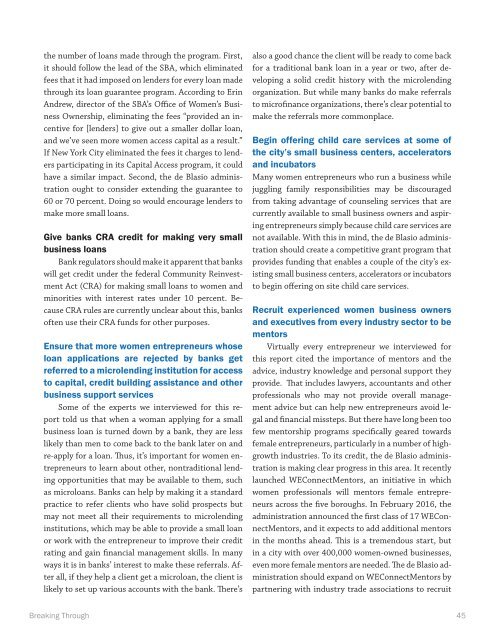BREAKING THROUGH
YWkgl
YWkgl
Create successful ePaper yourself
Turn your PDF publications into a flip-book with our unique Google optimized e-Paper software.
the number of loans made through the program. First,<br />
it should follow the lead of the SBA, which eliminated<br />
fees that it had imposed on lenders for every loan made<br />
through its loan guarantee program. According to Erin<br />
Andrew, director of the SBA’s Office of Women’s Business<br />
Ownership, eliminating the fees “provided an incentive<br />
for [lenders] to give out a smaller dollar loan,<br />
and we’ve seen more women access capital as a result.”<br />
If New York City eliminated the fees it charges to lenders<br />
participating in its Capital Access program, it could<br />
have a similar impact. Second, the de Blasio administration<br />
ought to consider extending the guarantee to<br />
60 or 70 percent. Doing so would encourage lenders to<br />
make more small loans.<br />
Give banks CRA credit for making very small<br />
business loans<br />
Bank regulators should make it apparent that banks<br />
will get credit under the federal Community Reinvestment<br />
Act (CRA) for making small loans to women and<br />
minorities with interest rates under 10 percent. Because<br />
CRA rules are currently unclear about this, banks<br />
often use their CRA funds for other purposes.<br />
Ensure that more women entrepreneurs whose<br />
loan applications are rejected by banks get<br />
referred to a microlending institution for access<br />
to capital, credit building assistance and other<br />
business support services<br />
Some of the experts we interviewed for this report<br />
told us that when a woman applying for a small<br />
business loan is turned down by a bank, they are less<br />
likely than men to come back to the bank later on and<br />
re-apply for a loan. Thus, it’s important for women entrepreneurs<br />
to learn about other, nontraditional lending<br />
opportunities that may be available to them, such<br />
as microloans. Banks can help by making it a standard<br />
practice to refer clients who have solid prospects but<br />
may not meet all their requirements to microlending<br />
institutions, which may be able to provide a small loan<br />
or work with the entrepreneur to improve their credit<br />
rating and gain financial management skills. In many<br />
ways it is in banks’ interest to make these referrals. After<br />
all, if they help a client get a microloan, the client is<br />
likely to set up various accounts with the bank. There’s<br />
also a good chance the client will be ready to come back<br />
for a traditional bank loan in a year or two, after developing<br />
a solid credit history with the microlending<br />
organization. But while many banks do make referrals<br />
to microfinance organizations, there’s clear potential to<br />
make the referrals more commonplace.<br />
Begin offering child care services at some of<br />
the city’s small business centers, accelerators<br />
and incubators<br />
Many women entrepreneurs who run a business while<br />
juggling family responsibilities may be discouraged<br />
from taking advantage of counseling services that are<br />
currently available to small business owners and aspiring<br />
entrepreneurs simply because child care services are<br />
not available. With this in mind, the de Blasio administration<br />
should create a competitive grant program that<br />
provides funding that enables a couple of the city’s existing<br />
small business centers, accelerators or incubators<br />
to begin offering on site child care services.<br />
Recruit experienced women business owners<br />
and executives from every industry sector to be<br />
mentors<br />
Virtually every entrepreneur we interviewed for<br />
this report cited the importance of mentors and the<br />
advice, industry knowledge and personal support they<br />
provide. That includes lawyers, accountants and other<br />
professionals who may not provide overall management<br />
advice but can help new entrepreneurs avoid legal<br />
and financial missteps. But there have long been too<br />
few mentorship programs specifically geared towards<br />
female entrepreneurs, particularly in a number of highgrowth<br />
industries. To its credit, the de Blasio administration<br />
is making clear progress in this area. It recently<br />
launched WEConnectMentors, an initiative in which<br />
women professionals will mentors female entrepreneurs<br />
across the five boroughs. In February 2016, the<br />
administration announced the first class of 17 WEConnectMentors,<br />
and it expects to add additional mentors<br />
in the months ahead. This is a tremendous start, but<br />
in a city with over 400,000 women-owned businesses,<br />
even more female mentors are needed. The de Blasio administration<br />
should expand on WEConnectMentors by<br />
partnering with industry trade associations to recruit<br />
Breaking Through 45


